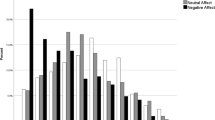Abstract
The current study examined the correlational relationship between specific cognitions and affective states in normal individuals. A research inventory composed of five hypothetical situations and a series of self-report measures of psychopathology was administered to 224 undergraduates. Participants responded to the inventory by rating the situational characteristicness of specific self-statements and affects. An additional 212 participants completed only an observer version of the inventory. Specific self-statements were found to be highly correlated with corresponding affective states in both the actor and observer inventory conditions. Specific irrational self-statements were also significantly related to noncorresponding dysphoric affects, while a negative relationship was obtained between rational cognitions and dysphoric affects. The magnitude of these relationships was significantly greater for low cross-situationally consistent individuals. Multiple-regression analyses indicated that although specific irrational self-statements and affects were only moderately correlated with corresponding self-report measures of psychopathology, the relationship between specific self-statements and affects with respect to the measures was an interactional one. The methodological features of the study and the implications of the findings are discussed.
Similar content being viewed by others
References
Beck, A.Depression: Clinical, experimental, and theoretical aspects. New York: Hoeber, 1967.
Beck, A.Cognitive therapy and the emotional disorders. New York: International Universities, 1976.
Bem, D., & Allen, A. On predicting some of the people some of the time: The search for crosssituational consistencies in behavior.Psychological Review 1974,81 506–520.
Buss, A., & Durkee, A. An inventory for assessing different kinds of hostility.Journal of Consulting Psychology 1957,21 343–349.
Coleman, R. Manipulation of self-esteem as a determinant of mood of elated and depressed women.Journal of Abnormal Psychology 1975,84 693–700.
Ellis, A. The basic clinical theory of rational-emotive therapy. In A. Ellis & R. Grieger (Eds.),Handbook of rational-emotive therapy. New York: Springer, 1977.
Eysenck, H. A short questionnaire for the measurement of two dimensions of personality.Journal of Applied Psychology 1958,42 14–17.
Goldfried, M., & Sobocinski, D. Effect of irrational beliefs on emotional arousal.Journal of Consulting and Clinical Psychology 1945,43 504–510.
Hale, W., & Strickland, B. Induction of mood states and their effect on cognitive and social behaviors.Journal of Consulting and Clinical Psychology 1976,44 155.
Hammen, C., & Krantz, S. Effect of success and failure on depressive cognitions.Journal of Abnormal Psychology 1976,85 577–586.
Kendall, P., & Korgeski, G. Assessment and cognitive-behavioral interventions.Cognitive Therapy and Research 1979,3 1–21.
LaPointe, K., & Harrell, T. Thoughts and feelings: Correlational relationships and crosssituational consistency.Cognitive Therapy and Research 1978,2 311–322.
Mahoney, M. Cognitive therapy and research: A question of questions.Cognitive Therapy and Research 1977,1 5–16.
Meichenbaum, D.Cognitive-behavior modification: An integrative approach. New York: Plenum, 1977.
Mischel, W. Toward a cognitive social learning reconceptualization of personality.Psychological Review 1973,80 252–283.
Mischel, W. On the future of personality measurement.American Psychologist 1977,32 246–254.
Nisbett, R., & Wilson, T. Telling more than we can know: Verbal reports on mental processes.Psychological Review 1977,84 231–259.
Rogers, T., & Craighead, W. Physiological responses to self-statements: The effects of statement valence and discrepancy.Cognitive Therapy and Research 1977,1 99–119.
Ross, L. The intuitive psychologist and his shortcomings: Distortions in the attribution process. In L. Berkowitz (Ed.),Advances in experimental social psychology (Vol. 10). New York: Academic Press, 1977.
Schroder, H., Driver, M., & Streufert, S.Human information processing. New York: Holt, Rinehart, & Winston, 1967.
Smith, E., & Miller, F. Limits on perception of cognitive processes: A reply to Nisbett and Wilson.Psychological Review 1978,85 355–362.
Trexler, L., & Karst, T. Further validation for a new measure of irrational cognitions.Journal of Personality Assessment 1973,37 150–155.
Velten, E. A laboratory task for induction of mood states.Behaviour Research and Therapy 1968,6 473–482.
Watson, D., & Friend, R. Measurement of social-evaluative anxiety.Journal of Consulting and Clinical Psychology 1969,83 448–457.
Weintraub, M., Segal, R., & Beck, A. An investigation of cognition and affect in the depressive experiences of normal men.Journal of Consulting and Clinical Psychology 1974,42 911.
Author information
Authors and Affiliations
Rights and permissions
About this article
Cite this article
Harrell, T.H., Chambless, D.L. & Calhoun, J.F. Correlational relationships between self-statements and affective states. Cogn Ther Res 5, 159–173 (1981). https://doi.org/10.1007/BF01172524
Issue Date:
DOI: https://doi.org/10.1007/BF01172524



